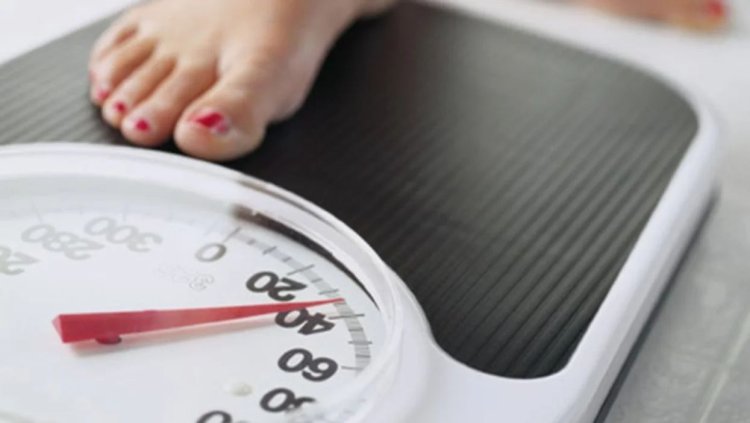Tips to Maintain a Healthy Weight
Maintaining a healthy weight is a holistic process. Here are some practical tips to help you maintain a healthy weight.

How to Maintain a Healthy Weight?
Maintaining a healthy weight involves a combination of balanced nutrition, regular physical activity, and lifestyle choices. Here are some tips to help you maintain a healthy weight.
What is my ideal weight?
There is no such thing as a "ideal weight," just as there are no flawless measures of obesity or overweight. However, there are a few methods for determining whether your weight is within a healthful range. These measurements – body mass index and waist circumference – may consider your height, shape, and gender. If you had a healthy weight as a young adult, it is optimal to maintain that weight throughout your existence.
Lose weight and keep it off
If you are overweight or obese, losing even 5 to 10 percent of your body weight can reduce your risk of heart disease and other conditions. As straightforward as it may sound, the key to weight loss is to create a deficit between the energy consumed via food and beverages and the energy expended throughout the day.
If you are overweight, to be successful at losing weight you should:
- become more physically active;
- eat appropriate amounts of healthy foods;
- build up muscle mass (because it burns more energy at rest than fat does); and
- try to make changes that you can stick to in the long term.
Have goals and rewards
Decide what is a healthy, achievable and sustainable weight for you, and give yourself a sensible time-frame to achieve it. Lose weight slowly (about 1-2 kilograms a month) as weight lost quickly usually comes back quickly. Set a number of short-term goals so you have a sense of achievement, and reward yourself with non-food treats when you achieve them.
Mind what you eat
- Eat a healthy diet consisting of plenty of vegetables, fruit, legumes (e.g. lentils, beans, chickpeas) and wholegrains (including wholegrain breads and cereals such as oats or muesli, pasta, brown rice, wholemeal couscous and other grain foods). Also include low-fat milk and dairy products, as well as some lean meat, poultry, fish, eggs or plant-based choices such as legumes, tofu, nuts and seeds. The so-called Mediterranean diet is a good example of a balanced diet that has been shown to help in weight loss and also provide benefits for heart health.
- Consume fewer foods containing saturated fats. Cut visible fat off meat; eat less fried food; eat fewer takeaways, sweet and savoury snacks, cakes, pastries and biscuits – all of which are high in saturated fat. Instead, choose moderate portions of foods containing healthy unsaturated fats such as extra virgin olive oil, avocado, nuts, seeds, oats, soybeans, fish and other seafood. Also, avoid reduced-fat foods where the fat has been replaced with sugar or refined starches such as maltodextrins.
- Limit intake of sugars. Avoid sugar-sweetened drinks such as soft drinks, cordial, sports drinks, energy drinks, fruit drinks, vitamin waters and cordial. Many studies now show such products increase the risk of weight gain. Also avoid adding sugar to tea or coffee and limit confectionery as well as cakes, biscuits and desserts.
- Drink plenty of water each day.
- Limit alcohol intake – it provides no nutrients, but plenty of kilojoules.
- Read labels, noting the kilojoules, saturated fat and sugars. Ingredients are listed in order of prominence in the product so it’s wise to avoid processed products where sugars and fats are close to the top of the list. Beware of so-called ‘low-fat’ or ‘reduced-fat’ foods or “lite” processed foods, as many are made palatable by adding lots of sugar or starches.
- Watch the kilojoules. An extra 200 kilojoules a day that you don’t need can add approximately 2 kilos a year. However, very low kilojoule diets are doomed to failure in the long-term and are usually nutritionally inadequate. Don’t be so strict that you feel deprived, because you won’t be able to sustain the effort.
Mind how you eat
- Think about your relationship with food; figure out if there are times when controlling food intake is hard. You may be eating for comfort, out of habit or absent-mindedness, or just because there’s food around. Find other ways of controlling stress, and break old habits.
- Don’t keep high fat or sugar treats in the house — have them when you are out, but only occasionally. Stock the fridge at all times with healthy options. Freeze healthy dinners, so fast is not fatty.
- Learn how to cook tasty, balanced meals with lots of vegetables and only small amounts of any fatty ingredients.
- Check your food portions — if you are in the habit of piling up your plate, try gradually easing back. Use smaller plates and bulkier foods so the ‘eye’ is full – filling up with fruit and vegetables provides essential dietary fibre and helps stave off hunger.
- Mindful eating. Try to chew and eat slowly, so the message that the stomach is full has time to reach the brain.
- Check drink portion sizes. A typical glass of wine is equivalent to 2 standard drinks and alcohol adds many kilojoules.
- Don’t skip meals. Establish regular eating patterns so that you don’t get hungry and then overeat.
- Don’t confuse thirst with hunger. Satisfy thirst with water or moderate quantities of tea or coffee.
Get moving
To lose weight, the majority of overweight and obese individuals must reduce their caloric intake and increase their physical activity.
Any increase in physical activity is beneficial to health, but for weight loss to be achieved and maintained, a substantial amount of activity is required. In addition to aiding in weight loss, increased physical activity reduces the risk of type 2 diabetes, colon cancer, and dementia in old age.
How much exercise is enough?
Start cautiously, perhaps with a 15-minute stroll several times per week. Adults who have been inactive have been shown to sustain fewer injuries if they progressively increase their activity level.
Work up to 150 to 300 minutes of moderate exercise (during which you can still carry on a conversation) per week; this equates to 25 to 50 minutes of exercise most days of the week. Or, 75 to 150 minutes of vigorous activity with a higher intensity. The Australian Physical Activity Guidelines for adults recommend these levels of physical activity for health benefits. To prevent weight gain, lose excess fat, and keep the weight off, you will likely need to engage in activity at the upper limit of these ranges.
Getting started
To improve your chances of success:
- Find something you enjoy and that is easy to get to or organise, otherwise you won’t do it.
- Exercise with a friend or the family.
- Schedule exercise and physical activity into your week. If you can’t schedule a block of time for exercise, try shorter bursts of activity, such as walking around the block at lunch time, after dinner, from a car park further away from the office or up the stairs, several times a day.
The benefits of physical activity for weight control are cumulative. Try building extra physical activity into your daily life too. Housework, gardening and using public transport instead of driving everywhere can all help.
Tone up
Strength training and activities that strengthen muscles increase your metabolism. At rest, muscle (also known as lean tissue) consumes more energy (kilojoules) than fat does. Every day, each kilogram of muscle requires more energy to maintain itself than each kilogram of fat. Therefore, gaining a few kilograms of muscle will cause you to consume more calories from food. In addition, the stronger you are, the more likely you are to exercise, and because you are toned, you will appear slimmer.
Increasing muscle mass also reduces the risk of developing type 2 diabetes.
Record your progress
Record your daily food intake and exercise. Studies have shown that this is the best way to ensure your weight-loss programme will succeed. Traditionally, using a diary was the best way to do this, but now there are a variety of devices that you can use, including;
- pedometers (to record how many steps you take each day); and
- apps and wearables that can help you measure your food intake, physical activity and calories burned, track your fitness and even record the quality of your sleep.
Weigh yourself regularly, say every week, at the same time of day, and record your progress. This has also been shown to help in managing weight loss.
Get enough sleep
It is essential to get enough sleep because sleep deprivation can lead to weight gain. Insufficient sleep can cause the body to release hormones that cause hunger and cravings for foods high in kilojoules and carbohydrates. You are more likely to consume food in an effort to restore your energy levels when you are fatigued.
Ask the professionals
Before you start, check with your doctor if you:
- have any health problems;
- are currently taking any medicine, or plan on taking any medicine; or
- plan to lose more than 6 to 8 kilograms.
Depending on your specific requirements, health professionals such as your primary care physician, dietitians, exercise physiologists, and psychologists should be able to assist you with your weight loss plan.
Also available are numerous weight loss programmes, personal trainers, gym programmes, online weight loss programmes, apps, and self-help literature.
Utilize common judgment. Choose a program that teaches you how to make permanent changes to your eating practices and physical activity levels in order to lose weight AND keep it off. If it offers a quick cure or suggests eliminating entire food groups from your diet, you should disregard it.
When choosing a weight-loss programme, ask yourself these questions:
- Is the person/staff qualified to offer advice?
- Does the programme include lifestyle changes in food intake AND physical activity?
- Does the programme promote a slow, gradual weight loss?
- Is there a maintenance plan included and does it teach you how to get through difficult times?
- Are the food choices flexible, suitable and affordable?
- Does the programme ask you to omit any of the major 5 food groups (vegetable; fruit; wholegrains; lean meat, fish, poultry, eggs, legumes, nuts and seeds; milk, cheese and yoghurt or plant-based alternatives)?
- Are there hidden costs (special foods/supplements)?
Also read: Achieving and maintaining an ideal weight
What doesn’t help weight loss?
Quick-loss, extremely low-kilojoule diet methods, the majority of pills, potions, and herbs, passive devices, and rub-on creams are ineffective for weight loss. There is also little evidence for complementary medicines or nutritional supplements as an aid to weight loss. Keep in mind that if something sounds too good to be true, it is almost surely a fraud. Don't spend your life searching for a cure for obesity. There is no such thing!
Prescription weight loss medications and surgery for weight loss (bariatric surgery) are typically reserved for individuals with a high BMI or a moderately high BMI in addition to other health concerns who have failed to lose weight through diet and exercise alone. These treatments must always be administered under medical supervision and accompanied by changes in lifestyle.
Maintenance – keep the weight off
The weight will be regained if dietary and physical activity changes are not maintained. Be wary of the'made it' syndrome, which occurs when you attain your goal weight and then revert to old habits.
People who succeed at long-term weight management tend to have:
- stuck with a healthy eating plan;
- regularly eaten breakfast;
- included high levels of regular physical activity or a consistent exercise routine;
- continued to weigh themselves regularly;
- had support from family or friends;
- maintained ongoing contact with their health professional;
- caught weight regain before it became a large-scale lapse; and
- developed strategies to deal with any emotional eating triggers.
So, if you have started to regain weight or are having difficulty in maintaining your weight loss, see your health professional for help to get back on track.














